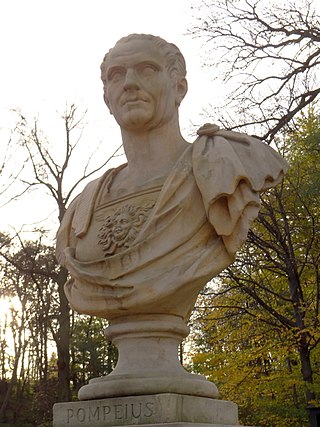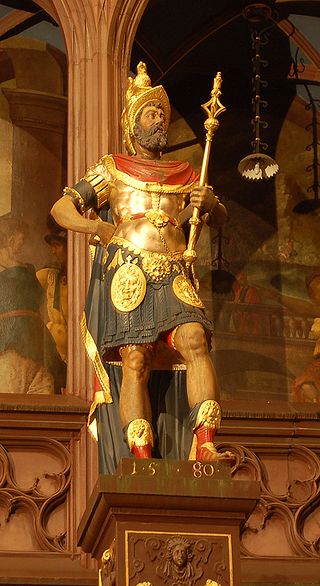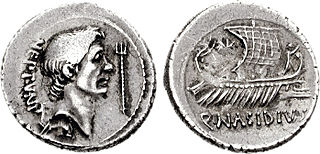Related Research Articles
The gens Scribonia was a plebeian family of ancient Rome. Members of this gens first appear in history at the time of the Second Punic War, but the first of the Scribonii to obtain the consulship was Gaius Scribonius Curio in 76 BC.

The gens Pompeia was a plebeian family at ancient Rome, first appearing in history during the second century BC, and frequently occupying the highest offices of the Roman state from then until imperial times. The first of the Pompeii to obtain the consulship was Quintus Pompeius in 141 BC, but by far the most illustrious of the gens was Gnaeus Pompeius, surnamed Magnus, a distinguished general under the dictator Sulla, who became a member of the First Triumvirate, together with Caesar and Crassus. After the death of Crassus, the rivalry between Caesar and Pompeius led to the Civil War, one of the defining events of the final years of the Roman Republic.
Publius Attius Varus was the Roman governor of Africa during the civil war between Julius Caesar and Pompey. He declared war against Caesar, and initially fought Gaius Scribonius Curio, who was sent against him in 49 BC.

The gens Marcia, occasionally written Martia, was one of the oldest and noblest houses at ancient Rome. They claimed descent from the second and fourth Roman Kings, and the first of the Marcii appearing in the history of the Republic would seem to have been patrician; but all of the families of the Marcii known in the later Republic were plebeian. The first to obtain the consulship was Gaius Marcius Rutilus in 357 BC, only a few years after the passage of the lex Licinia Sextia opened this office to the plebeians.
The gens Terentia was a plebeian family at ancient Rome. Dionysius mentions a Gaius Terentius Arsa, tribune of the plebs in 462 BC, but Livy calls him Terentilius, and from inscriptions this would seem to be a separate gens. No other Terentii appear in history until the time of the Second Punic War. Gaius Terentius Varro, one of the Roman commanders at the Battle of Cannae in 216 BC, was the first to hold the consulship. Members of this family are found as late as the third century AD.

The gens Minucia was an ancient Roman family, which flourished from the earliest days of the Republic until imperial times. The gens was apparently of patrician origin, but was better known by its plebeian branches. The first of the Minucii to hold the consulship was Marcus Minucius Augurinus, elected consul in 497 BC.
The gens Afrania was a plebeian family at Rome, which is first mentioned in the second century BC. The first member of this gens to achieve prominence was Gaius Afranius Stellio, who became praetor in 185 BC.
Marcus Petreius was a Roman politician and general. He was a client of Pompey and like Pompey he came from Picenum a region in eastern Italy. He cornered and killed the notorious rebel Catiline at Pistoia.

The gens Antistia, sometimes written Antestia on coins, was a plebeian family at ancient Rome. The first of the gens to achieve prominence was Sextus Antistius, tribune of the plebs in 422 BC.

The gens Pomponia was a plebeian family at ancient Rome. Its members appear throughout the history of the Roman Republic, and into imperial times. The first of the gens to achieve prominence was Marcus Pomponius, tribune of the plebs in 449 BC; the first who obtained the consulship was Manius Pomponius Matho in 233 BC.

The gens Lucretia was a prominent family of the Roman Republic. Originally patrician, the gens later included a number of plebeian families. The Lucretii were one of the most ancient gentes, and the second wife of Numa Pompilius, the second King of Rome, was named Lucretia. The first of the Lucretii to obtain the consulship was Spurius Lucretius Tricipitinus in 509 BC, the first year of the Republic.
Sextus Julius Sex. f. Sex. n. Caesar was a cousin of the Roman general Gaius Julius Caesar, and served as one of his lieutenants during the Civil War. He was killed in a revolt of the soldiers while still a young man.

The gens Nonia was a plebeian family at ancient Rome. Its members first appear in history toward the end of the Republic. The first of the Nonii to obtain the consulship was Lucius Nonius Asprenas in 36 BC. From then until the end of the fourth century, they regularly held the highest offices of the Roman state.

The gens Munatia was a plebeian family at Rome. Members of this gens are first mentioned during the second century BC, but they did not obtain any of the higher offices of the Roman state until imperial times.

The gens Nasidia was an obscure plebeian family at Rome. The gens is best known from Quintus Nasidius, one of the admirals of Gnaeus Pompeius Magnus during the Civil War. Although none of the Nasidii are known to have held any of the higher offices of the Roman state, a number are known from inscriptions. A coin of this gens depicts the head of Pompeius and a trident on the obverse, and on the reverse a ship, with the inscription Q. Nasidius.
The gens Petreia was a minor plebeian family at ancient Rome. Members of this gens are first mentioned toward the end of the second century BC, and several were distinguished as soldiers, but none of them ever attained the consulship.
The gens Staberia was a minor plebeian family at ancient Rome. Members of this gens are first mentioned in the final decades of the Republic, but they never achieved much importance. The most illustrious of the Staberii may have been the Grammarian Staberius Eros, though he was a freedman. One of this family served as a military tribune in the time of Vespasian, but none of the Staberii obtained any of the higher offices of the Roman state; the consul Marcus Pompeius Silvanus Staberius Flavianus belonged to the Pompeia gens, although he was probably descended from the Staberii through a female line.
The siege of Curicta was a military confrontation that took place during the early stages of Caesar's Civil War. Occurring in 49 BC, it saw a significant force of Populares commanded by Gaius Antonius besieged on the island of Curicta by an Optimate fleet under Lucius Scribonius Libo and Marcus Octavius. It immediately followed and was the result of a naval defeat by Publius Cornelius Dolabella and Antonius eventually capitulated under prolonged siege. These two defeats were some of the most significant suffered by the Populares during the civil war.
The battle off Carteia was a minor naval battle during the latter stages of Caesar's Civil War won by the Caesarians led by Caesar's legate Gaius Didius against the Pompeians led by Publius Attius Varus.
The Siege of Apamea was a failed attempt by the Caesarians near the end of Caesar's Civil War to capture the rebel city of Apamea, Syria Secunda. Lucius Statius Murcus and Quintus Marcius Crispus led the attempt to capture the city, while Equite Quintus Caecilius Bassus led the defence of the city.
References
- 1 2 3 4 Dictionary of Greek and Roman Geography, vol. II, pp. 492, 493 ("Oricum").
- 1 2 3 4 5 6 7 8 Appian, Bellum Civile, ii. 54.
- 1 2 Cassius Dio, lxi. 44.
- 1 2 3 4 Caesar, De Bello Civili, iii. 11.
- ↑ Broughton, Magistrates of the Roman Republic, vol. II, p. 277.
- ↑ Cassius Dio, lxi. 45.
- 1 2 Broughton, Magistrates of the Roman Republic, vol. II, p. 283.
- ↑ Broughton, vol. II, pp. 280, 285 (note 8).
- ↑ Caesar, De Bello Civili, iii. 12.
- ↑ Appian, Bellum Civile, ii. 55.
- 1 2 3 4 5 6 7 Caesar, De Bello Civili, iii. 40.
- 1 2 3 4 5 Meijer, History of Seafaring in the Classical World, p. 200.
- 1 2 Appian, Bellum Civile, ii. 56.
- ↑ Broughton, vol. II, p. 284.